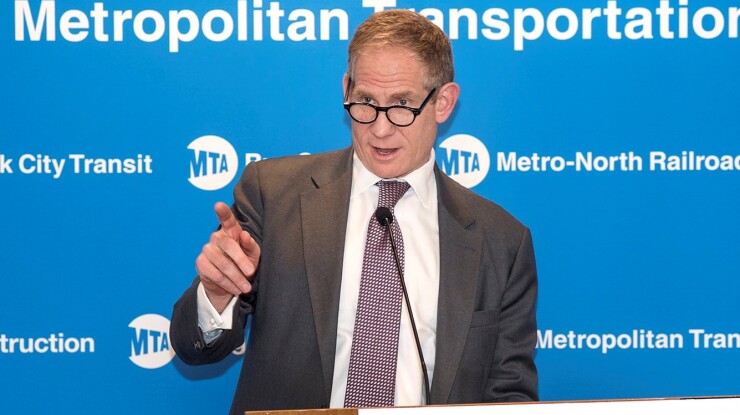As state officials pore through New York Metropolitan Transportation Authority’s five-year, $51.5 billion
The law, which slipped into the New York State budget bill under the radar and passed without public comment, requires the MTA to debar contractors for five years basically if they are 10% late or 10% over budget. The MTA then adopted it as an emergency rule.

Critics say its strictness could deter contractors from submitting bids at a time when the MTA intends to ramp up its modernization efforts.
Its capital program — the $51.5 billion is separate from roughly $3.3 billion in self-generated bridge and toll receipts — assumes 30% more revenue from the 2015-2019 plan, due to expected new revenue from congestion pricing for Manhattan and a mix of new taxes.
State Rep. Amy Paulin, D-Scarsdale, who chairs the General Assembly’s committee on corporations, authorities and commissions — an MTA overseer — said the emergency procurement rule the MTA adopted was much harsher than what was in the state budget bill.
“It is a terrible, terrible clause,” Paulin said. “It could jeopardize the plan.
“I believe that the companies that bid will not bid because they are going to be afraid of debarment for the most minor infraction,” Paulin said. “And, in fact, if they simply do not complete it on time not because of their own fault but because of the state’s fault, they’re still subject to possible debarment.”
Still, said Paulin, language in the bill could enable the MTA board to modify the rule.
MTA hierarchy and board members over the past four months have clashed with major contractors Siemens and Bombardier over the companies’ safety technology performance and project delays.
The review panel must act within 90 days on the capital program, which the MTA's board
Janno Lieber, MTA’s chief development officer and head of capital construction, expects the authority’s transformation plan and measures such as design-build project delivery to make contracting more manageable.
“We are trying to eliminate the things the MTA has done historically that have discouraged competition,” Lieber said. “We have just piles and piles of red tape, things that really chase away contractors. If you can start to chip away at some of that, I believe that we will attract a lot more competition.
“I think that we have to start to reach out beyond New York. What we’ve done is, we’ve kind of over time, distilled it down to a few contractors that have specialized in MTA bureaucracy. Some of them are very good builders but their real distinguishing characteristic is that they’ve mastered the MTA bureaucracy. And frequently they hire people who are veterans of the MTA, who can actually put up with us.”
Long Island Rail Road's third track and Ronkonkoma double-track reflect positively on design-build, LIRR President Phillip Eng said.
"We're finally seeing the fruition of them," Eng said at last week's American Public Transportation Association conference in Midtown Manhattan. "It demonstrates that agencies can do things differently. Doing the design-build procurement in parallel with the environmental process enabled us to accelerate the schedule."
The $2.6 billion third-track project is nearly one-third finished, on time and on budget one year after groundbreaking, according to Eng.
LIRR officials expect the roughly 10-mile track from Floral Park to Hicksville to enable bi-directional service during peak hours with a more reliable rail network. The work includes construction of parking garages, retaining walls, rail-bridge improvements and the removal of eight street-level grade crossings.
The MTA’s bridges and tunnels unit on Oct. 18 selected Nashville-based TransCore to design, build, operate and maintain its congestion-pricing toll system equipment and infrastructure for $507 million. Central business district tolling for Manhattan south of 60th Street CBDTP is targeted to be fully operational in 2021.
MTA officials, who selected TransCore after a competitive procurement process that featured proposals from two other vendors, expect to generate net revenue sufficient to support $15 billion of bonds for the new capital plan.
The MTA and the business organization Partnership for New York City have launched the second round of their Transit Tech Lab accelerator program, under which successful companies can pilot their technology with a participating transit system. Four did last year. This time, the Port Authority of New York and New Jersey, New York City's Department of Transportation and Taxi and Limousine Commission, NJTransit and Amtrak are also participating.
The need to break a longstanding construction culture triggered the call for procurement change, according to MTA board member Veronica Vanterpool.
“The MTA can certainly do better, our contractors need to do better and our vendors need to do better. That was the impetus," she said. “But what’s concerning is that in this field, we have limited competition as it is. We do need to not create these additional layers of process.”
A limited contractor pool could inhibit work on accessibility, a major emphasis in the capital plan and for New York City Transit President Andy Byford’s improvement initiative, called Fast Forward.
“I would hate to see competition reduced there,” Vanterpool said.
Other moving parts include the MTA's so-called transformation plan, which for now is laced with variables.
"One of the trickiest things in all of this consolidation is who's going to be in charge of construction," Nicole Gelinas, a senior fellow at the Manhattan Institute for Policy Research, said on a
The watchdog
“Rather than relying solely upon mandatory debarment, the MTA should introduce incentive-based measures to award the best performing contractors alongside discretionary debarment for the worst performing contractors,” CBC President Andrew Rein wrote MTA deputy general counsel Peter Sistrom.





